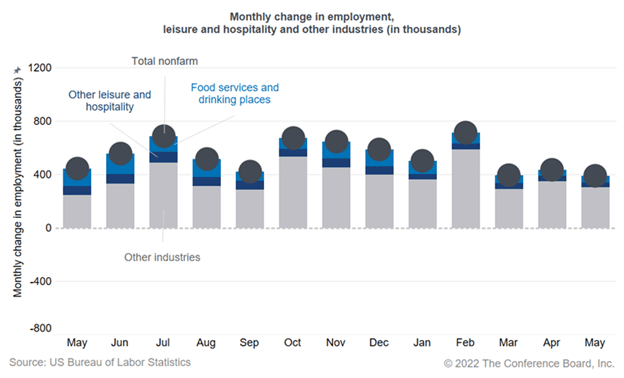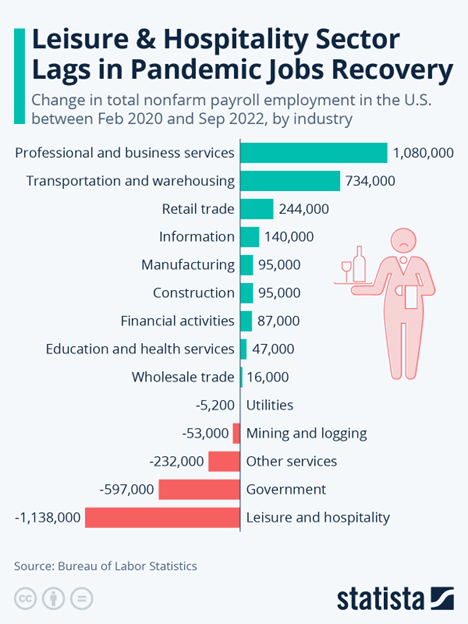The world of hospitality is an exciting one for several reasons. One is that once you get your feet wet working in hospitality, you tend to get the “bug.” That means you get a thrill from the work and the sometimes fast, and chaotic pace of the environment. Another reason is that there are so many avenues you can take in your hospitality career. Adding to the excitement is the decision to relocate your hospitality career if you so desire.
Due to the pandemic and the Great Resignation, hospitality jobs are now in abundance both in the US and abroad. That means relocating your hospitality career is easier than it’s ever been in a very long time.
Relocating your career to another city or country can be a rewarding adventure. Moving for a job comes with its fair share of excitement and challenges. Trying to identify the pros and cons of relocation can leave you having sleepless nights. To secure the joy and thrill of relocating your hospitality career, you’ll need to take some initial important steps. These steps aren’t complicated but are necessary to ensure the smoothest transition possible.
Steps for Finding Employment Somewhere Else
Before packing your bags to relocate to another city, or even country, you will need to take some necessary steps. These include making a list of the type of work you want as well as where you want to work. This seems simple enough, but having this in writing helps to bring clarity to your decision. Just willy-nilly moving to another city in hopes of finding your dream hospitality job may not be prudent. And it’s not the way to approach the change you desire. Instead, consider these steps for finding the right fit for you:
- Set goals-Setting goals helps trigger new behaviors, helps guides your focus and helps you sustain momentum. Also, put your goals in writing. There is magic in putting goals on paper. Writing down your goals narrows your focus and provides short-term motivation and excitement. Written goals force you to choose specific goals that are important to you in the long-term and short-term. Having this clarity helps you filter out things, activities, and people that might not support your goals.
- Scope out the place you want to relocate to-The area you want to relocate to might look like paradise to you, but go online and find out more. Research the area and find out what it costs to live there. Find out what hospitality businesses are there. What is the pay rate in that area? If you take a spouse and kids, what are the schools like? How much is housing? Keep a legal pad next to you as you find out this information. Don’t get discouraged if it is not what you thought the area would be like. Instead, be thankful you found out before moving. Now, consider your second choice for relocation. Consider which cities correspond to your hobbies, personal preferences, and lifestyle objectives.
- See if your current employer can help you-Find out if you are able to negotiate a severance package with your current employer. This could help with your relocation costs. Also, see if your new employer offers assistance with relocation. Many employers are willing to help because they need quality employees like yourself. Ask if the new employer you are considering can also help with covering the cost of housing. In this age of employee shortages, you might be able to negotiate more than you think.
- Do you have reserves saved?-Consider what you have saved and if that money can help carry you over in an emergency. After you’ve conducted your relocation research, write down all of the costs involved. If it takes a week or two to get moved to the new location, will you survive without a paycheck? Do you have enough money to cover health expenses? Enough to set up housing? Be conservative with your estimations. Maybe you’ll have to wait a couple of months before moving so you can build up a reserve. If so, it gives you more time to research, job hunt, and visualize yourself in your new surroundings.
- Make sure your resume is up to date-You should never let your resume get more than one year out of date. Even if you love your current job, apply this rule to your career. That way you’re not scrambling to revise your resume when you’re trying to relocate. If your resume does need revising, take your time and do it right. Review what you have now and make the necessary changes. A good tip is to only spend about an hour or so on it the first time. Then go back and review it again. You’ll be surprised at the mistakes you might find. Make the corrections, then put it down and come back again later. If possible, have someone experienced with writing resumes give it a once-over.
-

- Don’t make long-term commitments-Renting a home at first is a great way to settle in without making a long-term commitment. Having a mortgage and all that entails can feel like an anchor if you don’t like the job. Sign on for a short-term lease until you are sure you want to stay in that location.
- Seek the help of a good recruiter-When looking to relocate, there is no better help you can get than a recruiter. A good recruiter has done the homework for you and can help you find the employment you want. They can also advise you about the area including how to find housing.
Relocating to Another Country
Relocating your hospitality career internationally is different. You still want to do your research and plan for expenses, change, and commitments. However, a few additional important items to consider include:
Adjustment period-As with moving to other cities in the US, there will be an adjustment period. But relocating to another country might require a bigger adjustment. Cultural differences and understanding of the country’s laws and language are just a few of the changes you can expect.
Higher costs-Some countries may have higher expenses you have to allow for. The good news is that some, like Costa Rica, have lower costs than in the US. In your research, be sure to look up housing, food and transportation costs so you’re prepared.
Work visas-If you plan to work in a foreign country for a lengthy period of time, you’re going to need to get a work visa. Your employer may help you take care of this process and reimburse you for any associated costs. Be sure to verify this before making your relocation decision.
Temporary work-Because of the visa and some tax laws, your work abroad might be only temporary. Domestic relocation is typically more of a permanent basis if you so choose. But internationally may have its limitations for work duration.
Be Honest with Yourself and Others
Relocating to another hospitality job is exciting. It can be an adventure that changes your life in a wonderful way. But before you get all dreamy-eyed about the change, remind yourself that it is a change. In other words, you will be going out of your comfort zone. You will be in a new environment, meeting new people, and working in a new location. Step back and take a breath. Slow things down just a little and make sure you’re being honest with yourself and your expectations.
For example, get your availability timeline set before you start interviewing. It may take you four weeks to move once the position has been accepted. Be up front about it. Most employers will expect a longer transition if you are relocating, but keep it reasonable. You don’t want to risk losing out to a local candidate. When you get to your destination, don’t hesitate to ask others for help. Ask questions about the area—where to eat, shop, go for entertainment. Don’t pretend to be a local, but seek the advice from the natives. Then take time to bask in the fact that you’ve relocated your hospitality career to something you enjoy.







